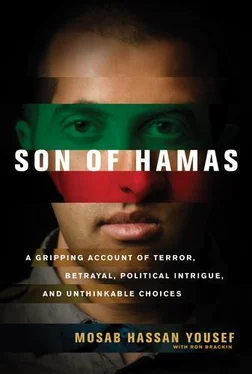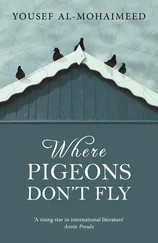Please understand, I did not write this book because I think I’m smarter or wiser than the great thinkers of the age. I am not. But I believe that God has given me a unique perspective by placing me on multiple sides of an apparently insoluble conflict. My life has been partitioned like the crazy little piece of real estate on the Mediterranean known as Israel by some, Palestine by others, and the occupied territories by still others.
My purpose in the pages that follow is to set the record straight on some key events, lay bare some secrets, and if all goes well, leave you with hope that the impossible can be accomplished.
Chapter One
CAPTURED
1996
I steered my little white Subaru around a blind corner on one of the narrow roads that led to the main highway outside the West Bank city of Ramallah. Stepping lightly on the brake, I slowly approached one of the innumerable checkpoints that dot the roads running to and from Jerusalem.
“Turn off the engine! Stop the car!” someone shouted in broken Arabic.
Without warning, six Israeli soldiers jumped out of the bushes and blocked my car, each man carrying a machine gun, and each gun pointed directly at my head.
Panic welled up in my throat. I stopped the car and threw the keys through the open window.
“Get out! Get out!”
Wasting no time, one of the men jerked open the door and threw me to the dusty ground. I barely had time to cover my head before the beating began. But even as I tried to protect my face, the heavy boots of the soldiers quickly found other targets: ribs, kidneys, back, neck, skull.
Two of the men dragged me to my feet and pulled me to the checkpoint, where I was forced onto my knees behind a cement barricade. My hands were bound behind my back with a sharp-edged plastic zip tie that was cinched much too tight. Somebody blindfolded me and shoved me into the back of a jeep onto the floor. Fear mingled with anger as I wondered where they were taking me and how long I would be gone. I was barely eighteen years old and only a few weeks away from my final high school exams. What was going to happen to me?
After a fairly short drive, the jeep slowed to a halt. A soldier pulled me from the back and removed my blindfold. Squinting in the bright sunlight, I realized that we were at Ofer Army Base. An Israeli defense base, Ofer was one of the largest and most secure military facilities in the West Bank.
As we moved toward the main building, we passed by several armored tanks, which were shrouded by canvas tarps. The monstrous mounds had always intrigued me whenever I had seen them from outside the gates. They looked like huge, oversized boulders.
Once inside the building, we were met by a doctor who gave me a quick once-over, apparently to make sure I was fit to withstand interrogation. I must have passed because, within minutes, the handcuffs and blindfold were replaced, and I was shoved back into the jeep.
As I tried to contort my body so that it would fit into the small area usually reserved for people’s feet, one beefy soldier put his boot squarely on my hip and pressed the muzzle of his M16 assault rifle into my chest. The hot reek of petrol fumes saturated the floor of the vehicle and forced my throat closed. Whenever I tried to adjust my cramped position, the soldier jabbed the gun barrel deeper into my chest.
Without warning, a searing pain shot through my body and made my toes clench. It was as if a rocket were exploding in my skull. The force of the blow had come from the front seat, and I realized that one of the soldiers must have used his rifle butt to hit me in the head. Before I had time to protect myself, however, he hit me again, harder this time and in the eye. I tried to move out of reach but the soldier who had been using me for a footstool dragged me upright.
“Don’t move or I will shoot you!” he shouted.
But I couldn’t help it. Each time his comrade hit me, I involuntarily recoiled from the impact.
Under the rough blindfold, my eye was beginning to swell closed, and my face felt numb. There was no circulation in my legs. My breathing came in shallow gasps. I had never felt such pain. But worse than the physical pain was the horror of being at the mercy of something merciless, something raw and inhuman. My mind reeled as I struggled to understand the motives of my tormentors. I understood fighting and killing out of hatred, rage, revenge, or even necessity. But I had done nothing to these soldiers. I had not resisted. I had done everything I was told to do. I was no threat to them. I was bound, blindfolded, and unarmed. What was inside these people that made them take such delight in hurting me? Even the basest animal kills for a reason, not just for sport.
I thought about how my mother was going to feel when she learned that I had been arrested. With my father already in an Israeli prison, I was the man of the family. Would I be held in prison for months and years as he had been? If so, how would my mother manage with me gone too? I began to understand how my dad felt—worried about his family and grieved by the knowledge that we were worrying about him. Tears sprang to my eyes as I imagined my mother’s face.
I also wondered if all my years of high school were about to be wasted. If I indeed was headed for an Israeli prison, I would miss my final exams next month. A torrent of questions and cries raced through my mind even as the blows continued to fall: Why are you doing this to me? What have I done? I am not a terrorist! I’m just a kid. Why are you beating me like this?
I’m pretty sure I passed out several times, but every time I came to, the soldiers were still there, hitting me. I couldn’t dodge the blows. The only thing I could do was scream. I felt bile rising in the back of my throat and I gagged, vomiting all over myself.
I felt a deep sadness before losing consciousness. Was this the end? Was I going to die before my life had really even started?
Chapter Two
THE LADDER OF FAITH
1955–1977
My name is Mosab Hassan Yousef.
I am the oldest son of Sheikh Hassan Yousef, one of the seven founders of the Hamas organization. I was born in the West Bank village of Ramallah, and I am part of one of the most religious Islamic families in the Middle East.
My story begins with my grandfather, Sheikh Yousef Dawood, who was the religious leader—or imam—for the village of Al-Janiya, located in the part of Israel that the Bible calls Judea and Samaria. I adored my grandfather. His soft, white beard tickled my cheek when he hugged me, and I could sit for hours, listening to the sound of his sweet voice chanting the adhan —the Muslim call to prayer. And I had plenty of opportunities to do so since Muslims are called to pray five times every day. Chanting adhan and the Qur’an is not an easy thing to do well, but when my grandfather did it, the sound was magical.
When I was a boy, some chanters bothered me so much that I wanted to stuff rags in my ears. But my grandfather was a passionate man, and he carried his listeners deep into the meaning of the adhan as he sang. He believed every word of it.
About four hundred people lived in Al-Janiya in the days when it was under Jordanian rule and Israeli occupation. But the residents of this little rural village had little use for politics. Nestled into the gently rolling hills a few miles northwest of Ramallah, Al-Janiya was a very peaceful and beautiful place. Its sunsets tinted everything in hues of rose and violet. The air was clean and clear, and from many of the hills’ peaks you could see all the way to the Mediterranean.
By four o’clock every morning, my grandfather was on his way to the mosque. When he finished morning prayers, he would take his little donkey to the field, work the soil, tend his olive trees, and drink fresh water from the spring that flowed down the mountain. There was no air pollution because only one person in Al-Janiya had a car.
Читать дальше












